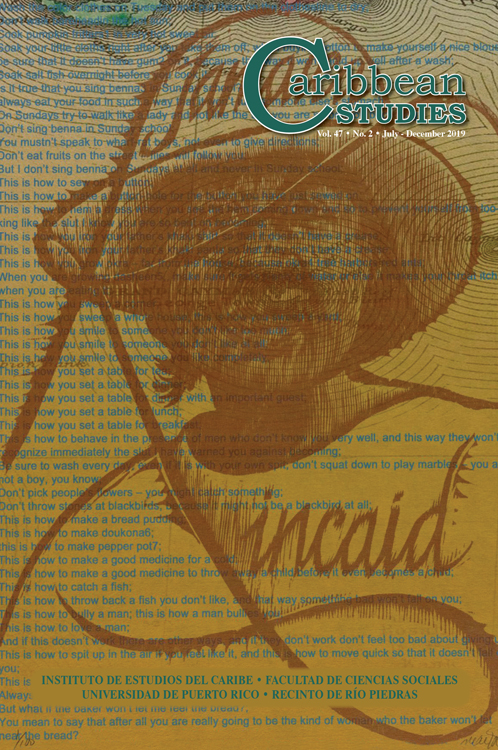Résumé
Cet article explore les possibilités de participation qui s’offrent à la société civile pour s’investir dans la recherche d’une politique mondiale dans la lutte contre le réchauffement climatique. Prenant comme exemple Trinidad et Tobago dans le contexte de marché plus vaste du CARICOM, cet article examine comment la société civile lutte contre le réchauffement climatique en analysant ses méthodes d’action, leur efficacité et les défis rencontrés. En dehors d’actions sociales menées àl’échelle internationale, les organismes de sociétés civiles se sont enga- gés dans la lutte contre le réchauffement climatique en matière d’édu-
cation, de campagnes de sensibilisation, de recherche et de formation au niveau communautaire ; leur impact sur les espaces officiels reste toutefois négligeable. Nous en concluons que le caractère transnational du changement climatique et l’approche de marché adoptée lors des discussions officielles sur le climat à l’échelle mondiale participent de coalitions mondiales progressistes visant à parvenir à une justice pour l’environnement qui reste essentielle. Cela nous semble d’autant plus important dans les cas où des mesures d’action au niveau national et régional ne sont pas toujours envisageables et/ou lorsque les intérêts locaux prédominent dans les échanges autour de l’environnement.
Références
Baker, G. 2002a. Civil Society and Democratic Theory: Alternative Voices. London: Routledge.
———. 2002b. “Problems in the Theorisation of Global Civil Society.” Political Studies 50(5):928-943.
Baptiste, A.K. and K. Rhiney. 2016. “Climate justice and the Caribbean: An introduction.” Geoforum 73(July):17-21.
Bernauer, T., T. Böhmelt, and V. Koub. 2013. “Is There a Democracy–Civil Society Paradox in Global Environmental Governance?” Global Environmental Politics 13(1):88-107.
Betsill, M.M. 2011. “International Climate Change Policy: Toward the Multilevel Governance of Global Warming,” in R. Axelrod, S. Van Danveer & D.L. Downie, eds. The Global Environment: Institutions Law and Policy. Washington DC: CQ Press, 111-131.
Betzold, C. 2010. “Borrowing’ power to influence international negotiations: AOSIS in the Climate Change Regime, 1990-97.” Politics 30(3):131-148.
Betzold, C., P. Castro & F. Weiler. 2012. “AOSIS in the UNFCCC Negotiations: From Unity to Fragmentation?” Climate Policy 12(5):591-613.
Beyerlin, U. & T. Marauhn. 2011. International Environment Law. Oxford: Hart Publishing.
Blake, D.K. 2004. “Direct Democracy and the New Paradigm of Democratic Politics in Jamaica.” Social and Economic Studies 53(4):163-190.
Brandsen, T., W.A. Trommel, and B. Verschueren. 2017. “The state and the reconstruction of civil society.” International Review of the Administrative Sciences, 83(4):676-693. Prospects and Challenges for Civil Society... 107
Caldwell, L.K. 1988. “Beyond Environmental Diplomacy: The Changing institutional structure of international Cooperation,” in J.E. Carroll, ed.
International Environmental Diplomacy: The management and resolution of transfrontier environmental problems. Cambridge: Cambridge University Press, 13-28.
CANARI. 2015. About Us. Retrieved from <http://www.canari.org/>.
Carbone, M. 2008. “Theory and Practice of Participation: Civil Society and EU Development Policy,” Perspectives on European Politics and Society 9(2):241-255.
CARICOM Secretariat. 1997. Charter of Civil Society for the Caribbean Community.
———. 2002. The Liliendaal Statement of Principles on Forward Together.
———. 2009 (December 16). CARICOM: Climate Change, a Clear and Present Danger.
———. 2015 (June 5). CARICOM Declaration for Climate Action. CYEN. (n.d.). Caribbean Youth Environment Network. CYEN. Retrieved from
Diamond, L. J. 1994. “Toward Democratic Consolidation.” Journal of Democracy 5(3):4-17.
Edwards, M. 2002. “Herding cats? Civil society and global governance.” New Economy 9(2):71-76.
———. 2009. Civil Society. Cambridge & Malden: Polity Press.
Edwards, M. & D. Hulme. 1996. “Too Close for Comfort: The Impact of Official Aid on Nongovernmental Organizations.” World Development 24:961-973.
Finkelstein, L.S. 1995. “What Is Global Governance?” Global Governance 1(3):367-372.
Fisher, D.R. 2004. “Civil society protest and participation: Civic engagement within the multilateral governance regime,” in N. Kanie and P. M. Haas, eds. Emerging Forces in Environmental Governance. Tokyo: UNU Press, 176-199.
Fisher, D.R., and J.F. Green. 2004. “Understanding Disenfranchisement: Civil Society and Developing Countries’ Influence and Participation in Global Governance for Sustainable Development.” Global Environmental Politics 4(3):65-84.
Ford, L.H. 2003. “Challenging Global Environmental Governance: Social Movement Agency and Global Civil Society.” Global Environmental Politics 3(2):120-134.
Fouéré, E. 1988. “Emerging Trends in International Environmental Agreements,” in J.E. Carroll, ed. International Environmental Diplomacy. Cambridge: Cambridge University Press.
Gach, E. 2019. “Normative Shifts in the Global Conception of Climate Change: The Growth of Climate Justice.” Social Science 8(1):1-18.
Holmes, G. 2012. “Biodiversity for Billionaires: Capitalism, Conservation and the Role of Philanthropy in Saving/Selling Nature.” Development and Change 43(1):185-203.
Hunter, D., J. Salzman & D. Zaelke. 2011. International Environmental Law and Policy. New York: Foundation Press.
Hurrell, A. 2007. On Global Order: Power, Values and the Constitution of International Society. Oxford: Oxford University Press.
IPCC. 2007. Climate Change 2007: Synthesis Report. Contribution of Working Groups I, II and III to the Fourth Assessment Report of the Intergovernmental Panel on Climate Change. Geneva, SUI: IPCC.

